Please join us this Wednesday for the first Contemporary Cultures & Societies seminar for Semester 2, 2015. I have also attached an updated seminar program for the semester. This series is convened by the Anthropology and Development Studies programs at the University of Melbourne, but many of the seminars are likely to be of more general interest. Everyone is welcome, so please forward this message – and the attached flyer/list – to anyone you think might be interested. I have also attached an updated seminar program.
(If you know anyone who would like to be added to the mailing list for these seminars, please ask them to contact me at [email protected])
Date/time: 12 August, 5:15-6:45pm
Venue: Old Arts Theatre D
__________________
Feminist Political Ecology and the Economics of Care: In search of Economic Alternatives
Wendy Harcourt (Erasmus University, The Hague)
Since the recent financial crisis in 2008 analytical and practical alternatives to the capitalist economy have seen a revival not only in different practices but also in theory. Especially under the umbrella term of “degrowth” alternative modes of economic experience and thinking have found a new life. The ideas linked to the concept of degrowth or post-growth are putting into question the coupling of economic growth and social welfare, which is foundational for the capitalist economy. Real life experiences suggest that this coupling is a fiction. To put it bluntly, economic growth does not remedy social inequality and it is no guarantee for individual and social well-being.
Feminist analysis has made important contributions to critiques of capitalism and the debate about what constitutes a good life. Core to this analysis is the economic and social value of social reproductive work done by women, in the paid care sector as well as in the private sphere of families and interpersonal relationships. To date, it is troubling that the conceptual frameworks of economic alternatives that combine green and non-capitalist approaches have failed to deal explicitly with gender issues around care. They neither take into account the importance of care work in the private sphere nor do they reflect critically on the gendered character of work as a whole. The symbolic order of masculinity and femininity that legitimizes gender hierarchies remains beyond their conceptual reach.
In her talk, Wendy Harcourt suggests how feminist political ecology presents alternatives to the capitalist economy that take feminist issues about social reproduction and care as central to environmental and economic alternatives.
Wendy Harcourt is Associate Professor at the International Institute of Social Studies of the Erasmus University, The Hague. She received the 2010 Feminist and Women’s Studies Association’s Prize for her book Body Politics in Development: Critical Debates in Gender and Development (2009). She was editor of the journalDevelopment from 1988 to 2011 and has published 10 edited collections that latest of which is Practicing Feminist Political Ecology: beyond the green economy with Zed Books. Her writings and research as a feminist political ecologist and post development scholar explore critical approaches to global development, feminist theory and sexual health and reproductive rights.


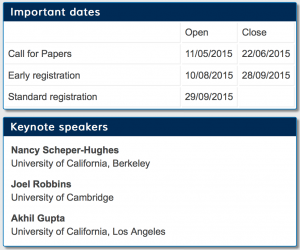 (AAS) will be hosted by the Anthropology Programme at the University of Melbourne from 1-4 December. This year’s conference “Moral Horizons” will address moral pluralities both within anthropological practice and in the rapidly evolving world the discipline researches.
(AAS) will be hosted by the Anthropology Programme at the University of Melbourne from 1-4 December. This year’s conference “Moral Horizons” will address moral pluralities both within anthropological practice and in the rapidly evolving world the discipline researches.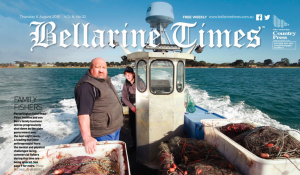
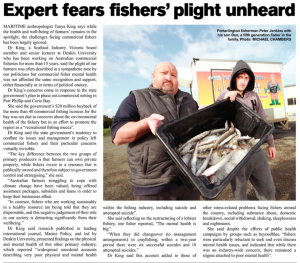 cribed in a sympathetic tone by our politicians but commercial fisher mental health was not afforded the same recognition and support, either financially or in terms of political oratory.
cribed in a sympathetic tone by our politicians but commercial fisher mental health was not afforded the same recognition and support, either financially or in terms of political oratory.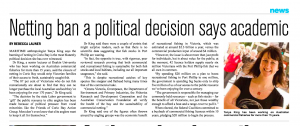 The 87 % of Victorians who do NOT fish recreationally are about to find that they can no longer purchase the local Australian seafood they’ve been enjoying for over 170 years. The closure of netting in Corio Bay will strip Victorian families of their access to fresh, sustainably caught fish. The decision by the Labor government to ‘gift’ the public resource to elite anglers has been made because of political pressure from vocal minorities like the Friends of Corio Bay Action Group (the president of which runs a recreational hire boat company). Most don’t even know that elite anglers want to keep it all for themselves.
The 87 % of Victorians who do NOT fish recreationally are about to find that they can no longer purchase the local Australian seafood they’ve been enjoying for over 170 years. The closure of netting in Corio Bay will strip Victorian families of their access to fresh, sustainably caught fish. The decision by the Labor government to ‘gift’ the public resource to elite anglers has been made because of political pressure from vocal minorities like the Friends of Corio Bay Action Group (the president of which runs a recreational hire boat company). Most don’t even know that elite anglers want to keep it all for themselves.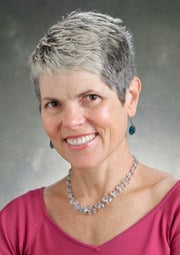 Abstract
Abstract